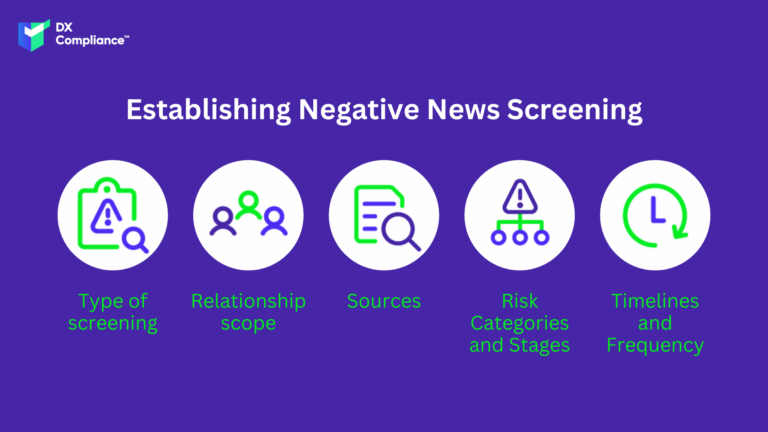28 September 2022, 15:52
Tagline
28 September 2022, 15:52
Tagline
In general, it can be said in advance that the negative news screening and adverse media check meaning are basically the same. The difference in terms comes from the fact that institutes such as the Wolfberg Group and Financial Action Task Force (FATF) name the same construct differently. Thus, they can be used as synonyms.
Negative news screening is the monitoring of information (called negative news) from customers or business partners in order to integrate it into risk management. In other words, deriving risks from the information.
But there are different approaches for the specific definition of negative news. Therefore, we refer to the generalized meaning: Negative news are information available from public sources which financial institutions would consider relevant to the management of financial crime risk.
Increasing awareness of potential financial crime risks from customers
Through NNS, an financial institution can leverage a range of information, data, and analytics that are publicly available and can be a useful tool to supplement customer due diligence (CDD) and identify factors that may impact the customer’s risk profile. This can raise financial institutions’ awareness of potential financial crime risks from existing and potential customers. It allows financial institutions to better understand who they are doing business with and what risks they are exposed to.
This is also covered by the FAFT recommendations:
Financial institutions should understand the client’s reputation, including if they were previously investigated for money laundering, terrorist financing or if they faced regulatory penalties.
When breaking news indicates that a customer is involved in unethical or criminal activity, such as money laundering or terrorist financing, companies must identify and evaluate these reports as efficiently as possible to reassess the customer’s risk profile and protect themselves from reputational damage.
In addition to the above mentioned reasons why NNS should be performed, the Wolfberg Group provides the following concrete opportunities as added value for companies:

There are several aspects to be determined when implementing NSS in your financial institution. These include, for example, type, timing and scope of screening.
Basically, it is possible to perform NNS manually, to use internet search engines or to automate the process through an internally or externally developed solution. It could also be a combination of all these options.
But since the manual process involves human review and interpretation, the large amount of information that companies must deal with during the screening process makes the process labor-intensive and time-consuming. To manage the information collected, best practice guidance recommends adding automation to the manual elements of the screening process.
Usually, NNS is performed for customers and business relationships. Depending on the financial institutions’ risk appetite, they may choose to expand the scope of NNS, e.g., to include vendors or third-party providers.
The following factors may be considered when making a decision:
Negative news can be found in many publicly available media sources. But screening is primarily done through content published and accessible online. The credibility of the media source is a key aspect in deciding whether it should be used in NNS or not. This includes factors such as the completeness, accuracy and reporting of the source being considered.
But what defines a serious, “good” source? For this we have a few guidelines. But it must be noted that it only represents the best case, as it usually occurs. Also sources, which do not fulfil the criteria, can be relevant! That must always be decided individually.
Not all negative news are the same. Therefore, the interpretation of negative news is simplified by a categorization in which the news is ordered according to the type and stage of the incidents.
It is important not to include all but only relevant incidents in the risk assessment. Thus, it should be ensured that negative reports related to financial crime are distinguished from other negative reports that are not relevant. For example, speeding fines should not be considered relevant. Finally, it is discretionary and consistent with the risk appetite of individual financial institutions.
A time period can be set for how far back the news are screened. For example, it may make sense to choose a higher number of years for serious crimes than for not-so-serious ones. In addition, after an initial review (e.g., at the start of operations), it may be necessary to review only new media events.
The frequency and phase of the customer lifecycle at which the NNS should occur must be defined. For example, this could be daily, weekly, monthly, quarterly or annually – or whenever CDD/EDD is performed, including onboarding or triggered event and others.
In order to successfully implement negative news screening, a financial institution must also establish an appropriate framework. That covers:
DX Compliance is an AML and Compliance firm helping our clients identify, prevent and report financial crime. DX Compliance help Banks, FinTech’s and Payments Providers to continually monitor their risk and detect the threat of money laundering to ensure compliance and reduce fines.
Our Adverse Media Screening module has a comprehensive library of financial crime filters & keywords. The coverage is in line with Industry standards and the legal and regulatory requirements. The solution is designed to be both effective and efficient.
The system screens for you for:
The Screening for Adverse Media can be carried out at the time of onboarding and manual ad hoc/ via our Instant CheckAML Platform.

08.08.2022
An overview of recent AML developments in the UAE.
Get access
15.10.2021
The introduction of 6AMLD regulations aims to reduce financial crimes.
Get access
27.07.2021 AML Compliance
Uncovering the PEP and Sanctions Lists and Global Regulation
Get access